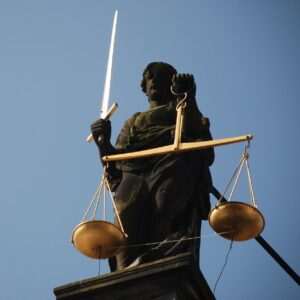The rule of law is a system of principles ensuring a just society and order within the state. This phrase or concept is typical for Anglo-American culture. In continental Europe, the term Rechtsstaat (State of law) is in use.
In summary, the rule of law means that all shall be equal before the law, not even the heads of state or government. No citizen, institution, business, or government can take advantage of the law. Each of them is accountable to it, and in return, it serves to protect them. Besides, the law must be the same for all. Without exception, everyone is entitled to a fair trial and the presumption of innocence. Hence, the separation of power is also a necessity.
Further “components” of the rule of law are an open and transparent government and state structure. The process of creating laws ought to be comprehensible and traceable. Besides, the system of laws should not be complicated. They must be unambiguous.

Another indication is corruption and security. States with high crime rates and corruption indexes tend to struggle with this crucial feature. Where anarchy, chaos, bribery, and violence thrive, the rule of law simply cannot. On the contrary, stability, order, and justice symbolize a higher standard of living. The concept is important namely for conservatives.
Lighthouse for Rule of Law
Several organizations keep an eye out on this matter, for example, the United Nations. For the UN, it is one of the most significant indications of the status quo, the situation, in a country.
World Justice Project creates an index of all countries: WJP Rule of Law Index (worldjusticeproject.org). They create this index based on various factors. Their goal is to prompt actions in the justice area. For example, one of their instruments is to educate on this topic.
Did you know, that Lady Justice is a symbol of just and equal law? She is blindfolded to demonstrate objectivity and scales to show the weighing of evidence. She uses her sword is for punishment.
